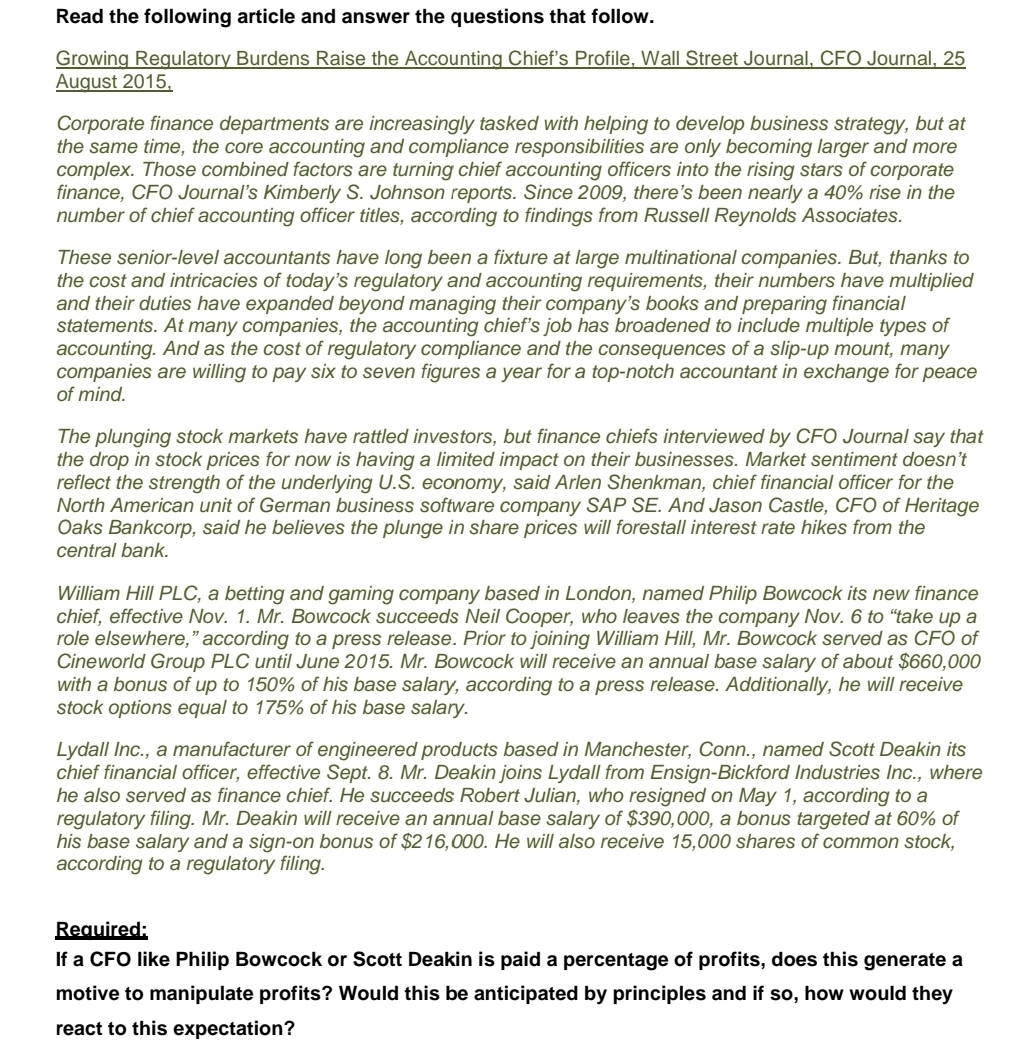Hello, If I could get help with this, I'd appreciate it. Could you please type it out that would be great as some handwriting is hard to read and when its pictures are posted the pictures are not clear. if i could have it within the hour that would be great. Thank you
Read the following article and answer the questions that follow. Growing Regulatory Burdens Raise the Accounting Chief's Profile, Wall Street Journal, CFO Journal, 25 August 2015, Corporate finance departments are increasingly tasked with helping to develop business strategy, but at the same time, the core accounting and compliance responsibilities are only becoming larger and more complex. Those combined factors are turning chief accounting officers into the rising stars of corporate finance, CFO Journal's Kimberly S. Johnson reports. Since 2009, there's been nearly a 40% rise in the number of chief accounting officer titles, according to findings from Russell Reynolds Associates. These senior-level accountants have long been a fixture at large multinational companies. But, thanks to the cost and intricacies of today's regulatory and accounting requirements, their numbers have multiplied and their duties have expanded beyond managing their company's books and preparing financial statements. At many companies, the accounting chief's job has broadened to include multiple types of accounting. And as the cost of regulatory compliance and the consequences of a slip-up mount, many companies are willing to pay six to seven figures a year for a top-notch accountant in exchange for peace of mind. The plunging stock markets have rattled investors, but finance chiefs interviewed by CFO Journal say that the drop in stock prices for now is having a limited impact on their businesses. Market sentiment doesn't reflect the strength of the underlying U.S. economy, said Arlen Shenkman, chief financial officer for the North American unit of German business software company SAP SE. And Jason Castle, CFO of Heritage Oaks Bankcorp, said he believes the plunge in share prices will forestall interest rate hikes from the central bank. William Hill PLC, a betting and gaming company based in London, named Philip Bowcock its new finance chief, effective Nov. 1. Mr. Bowcock succeeds Neil Cooper, who leaves the company Nov. 6 to "take up a role elsewhere, " according to a press release. Prior to joining William Hill, Mr. Bowcock served as CFO of Cineworld Group PLC until June 2015. Mr. Bowcock will receive an annual base salary of about $660,000 with a bonus of up to 150% of his base salary, according to a press release. Additionally, he will receive stock options equal to 175% of his base salary. Lydall Inc., a manufacturer of engineered products based in Manchester, Conn., named Scott Deakin its chief financial officer, effective Sept. 8. Mr. Deakin joins Lydall from Ensign-Bickford Industries Inc., where he also served as finance chief. He succeeds Robert Julian, who resigned on May 1, according to a regulatory filing. Mr. Deakin will receive an annual base salary of $390,000, a bonus targeted at 60% of his base salary and a sign-on bonus of $2 16,000. He will also receive 15,000 shares of common stock, according to a regulatory filing. Required: If a CFO like Philip Bowcock or Scott Deakin is paid a percentage of profits, does this generate a motive to manipulate profits? Would this be anticipated by principles and if so, how would they react to this expectation







